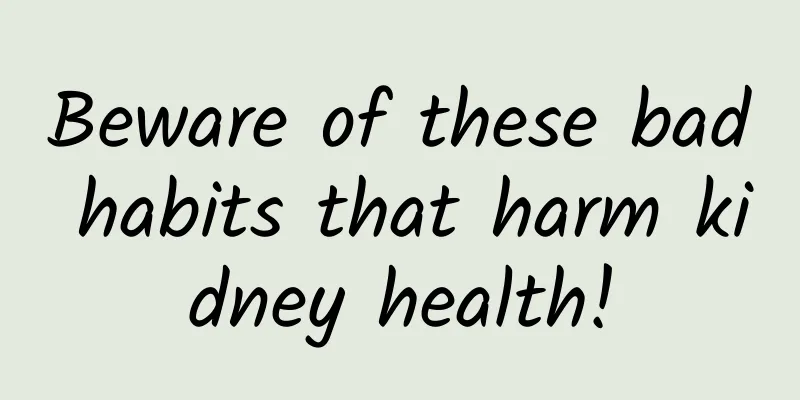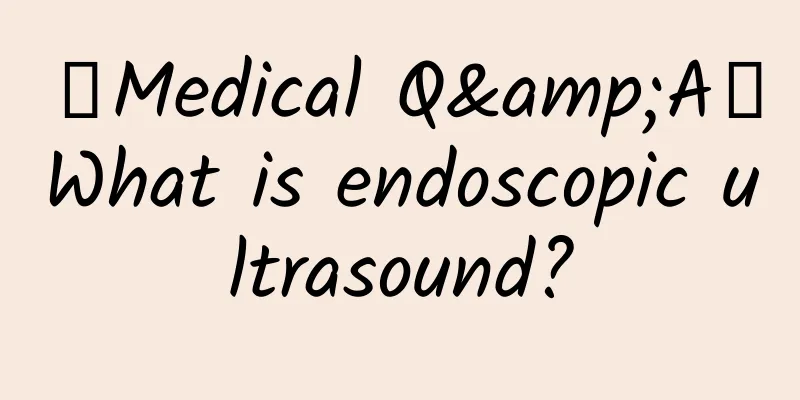Beware of these bad habits that harm kidney health!

|
Kidneys are important organs for the excretion of waste and toxins. Once damaged, mild cases may cause edema and proteinuria, while severe cases may progress to end-stage renal disease or uremia, and ultimately can only rely on hemodialysis or kidney transplantation to maintain life. Therefore, it is important to protect kidney health. In daily life, how can we better protect kidney health? Improve bad eating habits Don't eat too salty Salt is an important element for maintaining the sodium and water balance in the human body. Under normal circumstances, consuming about 6 grams of salt per day can meet the body's needs. However, in my country (especially in the north), people actually consume up to 13 to 15 grams of salt per day, and some even consume 20 grams, which is 2 to 3 times the normal intake and seriously exceeds the standard. Excessive salt intake can easily cause sodium and water retention in the body, leading to high blood pressure and aggravating damage to the heart and kidneys. Therefore, in daily life, we should try to eat a low-sodium diet. Drink plenty of water Many people think that water has no taste and do not like to drink it. In fact, this can easily cause physical harm. The metabolic waste in our body is mainly processed by the liver and kidneys. If you do not drink water for a long time, the urine volume will decrease, and the concentration of waste and toxins carried in the urine will increase, causing kidney damage. Common clinical kidney stones are closely related to not drinking water for a long time. Drink less beverages The main ingredients of beverages are carbonated water, sugar, spices, acidic substances such as citric acid, and some also contain caffeine and artificial colors, which are harmful to the human body. In particular, after drinking too much carbonated beverages containing caffeine, the calcium concentration in urine will increase significantly, and deposits will form stones. The more caffeine you take, the greater the risk of kidney stones. Eat less greasy food Frequent and uncontrolled consumption of sweets or greasy foods can easily lead to obesity, which can increase the fat content, weight, and volume of the kidneys, causing glomerular hypertrophy and affecting kidney function. At the same time, obese patients are also prone to insulin resistance, which can lead to diabetes. Nearly 40% of diabetic patients will develop diabetic nephropathy, which is one of the most difficult kidney diseases to treat. Therefore, eat less greasy food. Don’t consume too much protein A high-protein diet can lead to an increase in blood uric acid concentration, causing hyperuricemia. An increase in blood uric acid concentration is very damaging to the kidneys, and can easily cause lesions in the renal tubules and renal interstitium, and eventually develop into chronic renal failure, i.e. uremia. In addition, eating more vegetables and fruits, drinking less alcohol, and eating less fluffy bread are all good for the kidneys. Improve bad behavior and avoid drug abuse Many metabolic wastes produced in the human body are excreted through the kidneys, including the metabolites of drugs in the body, such as gentamicin, non-steroidal antipyretic analgesics and some compound cold medicines, which have obvious adverse reactions on the kidneys. Therefore, you cannot take medicine casually after you are sick. You need to take it correctly under the guidance of a doctor, especially patients with renal impairment or chronic kidney disease should be more cautious in taking medicine. Don't hold your urine Many people have the habit of holding urine, thinking that it will not cause much harm to the body. However, when holding urine, the bladder will swell, the blood vessels in the bladder wall will be compressed, the bladder mucosa will be ischemic, and the local resistance will be reduced, bacteria will take advantage of the opportunity to enter, which is very likely to cause cystitis and urethritis, and in severe cases, pyelonephritis. Once this type of infection recurs, it is easy to prolong and affect kidney function over time. Quitting smoking In addition to increasing the chance of cancer, long-term smoking also increases blood viscosity and blood pressure. Long-term hypertension can cause renal arteriolar spasm, leading to renal vascular ischemia and hypoxia, which in turn damages glomerular endothelial cells and causes proteinuria. Long-term poorly controlled hypertension can cause renal dysfunction. Don't stay up late Staying up late will not only disrupt the body's biological clock, but also cause metabolism to become disordered, causing the kidneys that should be resting to continue working, resulting in a decrease in renal reserve function and making it easy to develop kidney disease. In addition, overeating and improper exercise can also cause great harm to the kidneys. Therefore, in daily life, we should avoid overeating and improper exercise to protect our kidney health. |
<<: What should I do if I have uremia? Is there really no cure?
>>: Will eating soy milk and eggs together cause indigestion? Don’t drink this kind of soy milk!
Recommend
Women's stomach and belly are getting bigger
Some people want a baby but just can't get pr...
What is the function of yeast? If the yeast is expired and the dough cannot rise, can we still use it?
Yeast belongs to the kingdom of fungi, family Sac...
How to choose healthy food
Author: Chen Zhou Shanghai Changhai Hospital Revi...
How to make nipples pink
There are many reasons why women's nipples tu...
Can drinking more water during menstruation help you lose weight? Here are some healthy ways to lose weight during menstruation.
Many people believe that losing weight is most ef...
The relationship between blocking antibody negative fetal arrest
Fetal arrest means that the fetus stops growing i...
Who is not easy to get pregnant
Women have been responsible for reproducing offsp...
Can women with nephrotic syndrome get pregnant?
For women, whether they can get pregnant is a ver...
Why do I have frequent urination the next day after having sex?
Sexual life is very common in people's lives,...
What can pregnant women eat to relieve nausea?
Pregnant women usually experience pregnancy react...
What brand is Anjia Fangsijin's mobile phone? What are the models and prices of the same mobile phones as Anjia Fangsijin?
What phone does Fang Sijin use in An Jia? In the ...
If you have trouble standing up, an exoskeleton robot can help
Authors: Gao Dayong, Chen Jibao; Chief Judge: Zha...
The difference between breast radiation therapy and chemotherapy
Breast cancer must be treated promptly. The most ...
Why do I have back pain during early pregnancy?
For pregnant women, there are many things to pay ...
Is colposcopy uncomfortable?
Colposcopy is a diagnostic instrument for gynecol...









